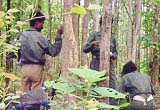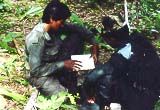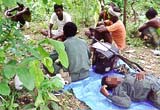

 Karan starts with the time when the PW decided to establish the Dandakaranya guerrilla zone. This was shortly after the Adilabad, Nizamabad, Karimnagar and Khammam districts of Andhra Pradesh were grouped together to form the North Telengana zone, the first of PW's guerrilla areas. DK was meant to be a base camp, a retreat for the Telengana guerrillas if they had to fall back. Today, however, it is in a much stronger position than NT, where encounters and killings of Naxals are everyday occurrences. This is mainly because NT is scarce in forest cover, the mightiest of all guerrilla weapons.
Karan starts with the time when the PW decided to establish the Dandakaranya guerrilla zone. This was shortly after the Adilabad, Nizamabad, Karimnagar and Khammam districts of Andhra Pradesh were grouped together to form the North Telengana zone, the first of PW's guerrilla areas. DK was meant to be a base camp, a retreat for the Telengana guerrillas if they had to fall back. Today, however, it is in a much stronger position than NT, where encounters and killings of Naxals are everyday occurrences. This is mainly because NT is scarce in forest cover, the mightiest of all guerrilla weapons.
"The first stage of any revolution," Karan is telling us, "is the preparatory stage. It involves building a mass base to start guerrilla operations. The second is what you see now, guerrilla warfare. The third stage is a liberated zone, an area which is completely free of state control."
The second stage can further be divided into primary and secondary. DK is now in the lower level, and the immediate task before the PW is to take it to the higher stage. This would require that there are platoons throughout the zones (three squads form a platoon), 2 to 3 local guerrilla squads under all squad area committees and the presence of people's militia. Plus, there should be a centralised military command. As of now, the PW has only two platoons -- one each in Gadchiroli and Telengana.
Though only initial-stage guerrilla areas, the people in the two zones, especially DK, appear more tuned to the PW than the government. Thus, large sections of the DK's 8 million population pay tax to the PW, not to the State. This support, to a large extent, was prompted by two major fights that the party took up for the tribals. In 1982, a labourer was paid only three paise for a bundle of 75 tendu leaves. Today, it is Rs 1.33.
 Similarly, the PW had brought the bamboo labourers under its umbrella, causing the mills to raise their payment for a bundle (20 pieces) from 30 paise in 1982 to Rs 5.35 in 1996.
Similarly, the PW had brought the bamboo labourers under its umbrella, causing the mills to raise their payment for a bundle (20 pieces) from 30 paise in 1982 to Rs 5.35 in 1996.
"The villagers give one day's labour to the party every season. We collected around Rs 1 million from them in Gadchiroli division alone," Karan says, "A part-time party worker who holds a regular job, contributes five per cent of his salary. Then there are contributions from sympathisers and well-wishers, besides the tax on bamboo mill owners."
The PW doesn't need much money as an organisation. The villagers take care of the food requirements of the squads. And the weapons and ammunition are mostly seized from the police. The other operational costs are easily met through contributions, Karan says.
A little later -- at 1430 hours, according to my diary -- we break up for lunch. Rice, mixed dal and bengan (brinjal). I think it is the jungle air, but my appetite seems to have reached revolutionary proportions. Three huge helpings of rice disappear in no time. Even the bengan, which I would normally run a mile to avoid, finds favour with me today.
In tribute to the oppressive heat, we are to sit down only by 1400 hours. Karan is trying to catch a little sleep. The others too are taking it easy. A few guerrillas, mostly 'patients', are dozing. The rest are up -- stitching, talking, but mostly bending over books.
To the left, an outlaw is stitching a rucksack out of coarse black canvas. He's pretty good with the thick long needle, guiding it in and out with enough speed and dexterity to give many of the Bombay cobblers I know a complex. In less than four days, he would have a nice, sturdy backpack.
A little ahead, Vishwanath is teaching another outlaw English. They have a big colourful book, the kind you find in nursery, open on the ground. "A," says Vishwanath, pointing with his stubby finger. The other repeats, and Vishwanath's finger moves to the next letter...
 The sun is tolerably over the right side of the sky when we, assisted by tall glasses of sugary tea, reopen our conversation. There's a smoke-fire on beside us, and, as usual, a couple of guerrillas near Karan.
The sun is tolerably over the right side of the sky when we, assisted by tall glasses of sugary tea, reopen our conversation. There's a smoke-fire on beside us, and, as usual, a couple of guerrillas near Karan.
"We have to strengthen our mass base," Karan starts, "Our vision is to create a new democracy where the leadership will be that of the proletariat. We will spread our movement through the rural areas of Central India, then to the North-East. Ek ek guerrilla zones banake, ek ek liberated zones banake aage jaana padega (We have to go forward by creating guerrilla zones and liberated zones). Then by consolidating our forces, we will build a red army that will capture power.
"We would form alliances with all the forces who are fighting the State. We already have an agreement with the ULFA. Our forces would be grouped under a united democratic front. Once the main battle is won, these forces will have the freedom of self-determination. If they want to be part of our movement, they would be welcome. If they want a separate land, like the Nagas do, we will grant them that," he pauses.
The PW's enemies are only the imperialists, not the petty bourgeoisie or the middle class. Once in power, the property of the multinationals and big bourgeoisie would be confiscated and redistributed among the landless.
"There will be a complete turn around. The men who rule now, the imperialists and big bourgeois, they will be under the control of a proletariat leadership," the Naxal leader explains, "There will be land and property ceilings. But this doesn't mean we would victimise them or shoot them down. The bourgeoisie would have equal rights as the rest. Simultaneously, we will struggle with the ideology of the imperialists and try to win them over to Communism. We will be working towards building a commune, building co-operatives where everything -- factories, farms -- will be jointly owned by the masses."
How, we ask him, will such a power relate to the rest of the world? Who would be its enemies?
"The imperialistic forces," Karan replies, "The Third World countries will be our friends. Later, in the years to come, these imperialistic countries will also fall, there will be revolutions there and Communist regimes will emerge... "
The talk carries on -- with a couple of breaks when Karan, in answer to the alarm on his watch, excuses himself to listen to the news on his radio -- till it is time for dinner. A few of the guerrillas are grouped round a campfire, singing. The song is tribal, its tune simple and pure.
By the time we finish the dinner of rice and dal, it is time for sleep. It looks as if it's going to rain. The guerrillas have put up a tent for us. G, R and H make their bed inside, but it is too stuffy there. I decide to sleep out. I find a comfortable place near Karan who looks a bit haggard -- malaria, coupled with the attack of the media, would make anyone tired, I should think!
I hand him a questionnaire that I want him to answer. Karan goes through it, nods, and promises to tackle it the next day. The candle is blown off, and I settle down to sleep.
Through the ring of trees overhead, I can see a large patch of grey sky, unusually luminous despite the threat of rain. Around me, the camp is silent, starting to doze off. A couple of fires still burn lethargically, radiating a cosiness that belongs more to a summer camp than here in a guerrilla area. Peaceful.
But I feel uneasy. My notebooks, taped cassettes and exposed film rolls are inside the tent. I quietly get up, fish out the stuff in the light of a pen-torch, wrap everything in a plastic cover and return to bed. Hereafter, I make a mental note, I must have these on me all the time.
Page design: Dominic Xavier